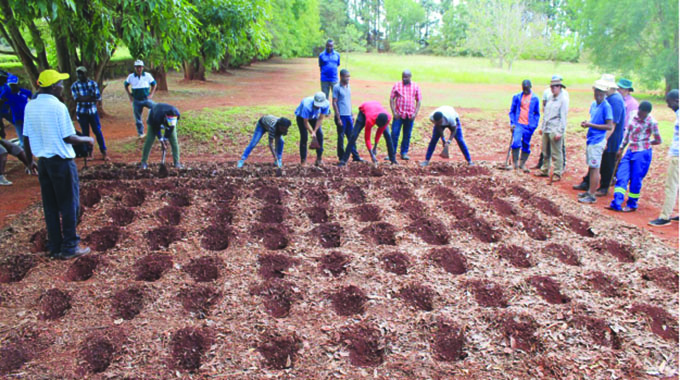Time to wrap up land preparations is now!

Obert Chifamba
Agri-Insight
Rains that fell between Monday and Tuesday last week left many farmers scuttling to wrap up land preparations or secure outstanding inputs requirements, amid indications that the season had set in and they risked being left behind.
I bet those that work closely with agricultural extension officers made inundating enquiries with their regional Agritex or meteorological offices seeking advice on whether or not the rainy season had started so they could start planting or otherwise.
What made the situation slightly unfamiliar and worrisome is that in recent years, most seasons usually kick off around the 15th of October, hence our dear farmers justifiably thought they had been caught napping, especially with the current climate change challenges that have seen seasons shifting slightly or even drastically in some cases.
The Meteorological Services Department (MSD) duly offered a statement to the effect that the rains did not signify the start of the 2020/21 farming season, hence there was no need for farmers to press the panic button, which brought sighs of relief to many.
The department also advised farmers not to start planting with the rains as they ran the risk of experiencing botched germinations or even enjoy good germination percentages, but the newly emerged plants could be exposed to a debilitating dry spell before the actual rains set in.
Of course, there were lessons to be learnt from the experience.
One of such lessons is that farmers should not leave it until the last minute to conclude their preparations or just get started because there are chances seasons may shift with climate change challenges currently rocking the world.
The astute farmer starts preparations for the next season just after harvesting the last season’s crop.
This is the time the farmer should start mobilising resources such as seed, fertilisers and chemicals and even doing winter ploughing to promote high water retention capacities in their soils.
In some cases, the farmers will not even need to do fresh tilling come the new season, as they can simply get down to planting because the land would have been tilled already.
Tilled land is also easy for infiltration by rains, which ultimately boosts moisture retention, promoting high germination percentages in the process.
On the one hand, the Pfumvudza team should use this intervening period to do their final touches to the planting holes if they had not done so or that while those that had not finished the digging and filling up should hasten, lest the actual rains marking the start of the season come through and find them unprepared.
If they are planning to expand the area under Pfumvudza using their own resources, they should use this time to run around and secure the needed inputs such as seed and basal fertiliser, which is part of the crucial mixture of manure the holes need to support crops effectively.
It is also the time they should be engaging extension officers to come and do their final checks on the way they (farmers) have established their planting stations.
There are also farmers outside Pfumvudza who could not resist the lure of the programme and adopted it, but had not been trained.
This is again the time they should seek the expert instruction of extension officers so that they do the concept properly to achieve good yields.
Now that the Met Department has put to rest most farmers’ anxieties on rains, it is time to wrap up land preparations so that when the season eventually sets in, everything will be in place and what will be remaining will only be the planting.
Those farmers who can do dry planting should now do so, but in close collaboration with their extension officers so that they get advice on the right moisture levels to check for in the soils, lest they put seed to waste if they plant when the soil still has some bit of moisture that may promote false germination opportunities.
It is exciting to note that this time around, many farmers, especially in the communal areas, have some pieces of land that are ready for planting courtesy of the Pfumvudza programme whose preparations started as far back as July, although planting still needs to be done at the right time so that high germination percentages can be attained.
Remember, such farmers will naturally be miles ahead of their counterparts doing conventional land preparations because the planting holes they dug in their fields will trap most of the water that comes in while the humus they added will add to the soil’s moisture retention capacity.
The Pfumvudza programme that is being spearheaded by the Government is targeting 1,8 million rural households and is a climate-proofed concept meant to cushion farmers from possible droughts and boost yields and ultimately food security in the process.
On the other hand, those farmers who had not secured all the inputs they need for this new season must now hasten to do so.
If it means selling some assets or borrowing, so be it, because the season is promising to be a productive and fruitful one if the forecast by Met Department is anything to go by.
The country is expected to have normal to above normal rains, while there are also chances for a La Nina weather pattern hitting the Southern African region that includes Zimbabwe.
The La Nina weather pattern is usually associated with heavy downpours or even floods in some instances, and is the exact opposite of the El Nino weather pattern, which is generally associated with very low rainfall amounts or even outright droughts and, therefore, not good for agriculture.
Armed with such information about the season, farmers will need to work closely with Agritex and pay close attention to weather bulletins from the meteorological office so that they are not caught unaware in the event of the La Nina predictions coming to materialise, especially as the phenomenon is at times accompanied by destructive tendencies.









Comments